Spying, hacking and intimidation: Israel’s nine-year ‘war’ on the ICC exposed
By Harry Davies, Bethan McKernan, and Yuval Abraham in Jerusalem, and Meron Rapoport in Tel Aviv, reposted from The Guardian
Investigation reveals how intelligence agencies tried to derail war crimes prosecution, with Bibi 'The Baby Butcher' Netanyahu ‘obsessed’ with intercepts
When the chief prosecutor of the international criminal court (ICC) announced he was seeking arrest warrants against Israeli and Hamas leaders, he issued a cryptic warning: “I insist that all attempts to impede, intimidate or improperly influence the officials of this court must cease immediately.”
Karim Khan did not provide specific details of attempts to interfere in the ICC’s work, but he noted a clause in the court’s foundational treaty that made any such interference a criminal offense. If the conduct continued, he added, “my office will not hesitate to act”.
The prosecutor did not say who had attempted to intervene in the administration of justice, or how exactly they had done so.
Now, an investigation by the Guardian and the Israeli-based magazines +972 and Local Call can reveal how Israel has run an almost decade-long secret “war” against the court. The country deployed its intelligence agencies to surveil, hack, pressure, smear and allegedly threaten senior ICC staff in an effort to derail the court’s inquiries.
Israeli intelligence captured the communications of numerous ICC officials, including Khan and his predecessor as prosecutor, Fatou Bensouda, intercepting phone calls, messages, emails and documents.
The surveillance was ongoing in recent months, providing Israel’s prime minister, Benjamin Netanyahu, with advance knowledge of the prosecutor’s intentions. A recent intercepted communication suggested that Khan wanted to issue arrest warrants against Israelis but was under “tremendous pressure from the United States”, according to a source familiar with its contents.
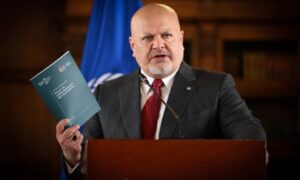
Bensouda, who as chief prosecutor opened the ICC’s investigation in 2021, paving the way for last week’s announcement, was also spied on and allegedly threatened.
Netanyahu has taken a close interest in the intelligence operations against the ICC, and was described by one intelligence source as being “obsessed” with intercepts about the case. Overseen by his national security advisers, the efforts involved the domestic spy agency, the Shin Bet, as well as the military’s intelligence directorate, Aman, and cyber-intelligence division, Unit 8200. Intelligence gleaned from intercepts was, sources said, disseminated to government ministries of justice, foreign affairs and strategic affairs.
A covert operation against Bensouda, revealed on Tuesday by the Guardian, was run personally by Netanyahu’s close ally Yossi Cohen, who was at the time the director of Israel’s foreign intelligence agency, the Mossad. At one stage, the spy chief even enlisted the help of the then president of the Democratic Republic of the Congo, Joseph Kabila.
Details of Israel’s nine-year campaign to thwart the ICC’s inquiry have been uncovered by the Guardian, an Israeli-Palestinian publication +972 Magazine and Local Call, a Hebrew-language outlet.
The joint investigation draws on interviews with more than two dozen current and former Israeli intelligence officers and government officials, senior ICC figures, diplomats and lawyers familiar with the ICC case and Israel’s efforts to undermine it.
Contacted by the Guardian, a spokesperson for the ICC said it was aware of “proactive intelligence-gathering activities being undertaken by a number of national agencies hostile towards the court”. They said the ICC was continually implementing countermeasures against such activity, and that “none of the recent attacks against it by national intelligence agencies” had penetrated the court’s core evidence holdings, which had remained secure.
A spokesperson for Israel’s prime minister’s office said: “The questions forwarded to us are replete with many false and unfounded allegations meant to hurt the state of Israel.” A military spokesperson added: “The IDF [Israel Defense Forces] did not and does not conduct surveillance or other intelligence operations against the ICC.”
Since it was established in 2002, the ICC has served as a permanent court of last resort for the prosecution of individuals accused of some of the world’s worst atrocities. It has charged the former Sudanese president Omar al-Bashir, the late Libyan president Muammar Gaddafi and most recently, the Russian president, Vladimir Putin.
Khan’s decision to seek warrants against Netanyahu and his defense minister, Yoav Gallant, along with Hamas leaders implicated in the 7 October attack, marks the first time an ICC prosecutor has sought arrest warrants against the leader of a close western ally.
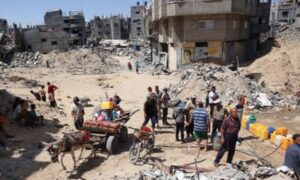
The allegations of war crimes and crimes against humanity that Khan has leveled against Netanyahu and Gallant all relate to Israel’s eight-month war in Gaza, which according to the territory’s health authority has killed more than 35,000 people.
But the ICC case has been a decade in the making, inching forward amid rising alarm among Israeli officials at the possibility of arrest warrants, which would prevent those accused from traveling to any of the court’s 124 member states for fear of arrest.
It is this specter of prosecutions in The Hague that one former Israeli intelligence official said had led the “entire military and political establishment” to regard the counteroffensive against the ICC “as a war that had to be waged, and one that Israel needed to be defended against. It was described in military terms.”
That “war” commenced in January 2015, when it was confirmed that Palestine would join the court after it was recognized as a state by the UN general assembly. Its accession was condemned by Israeli officials as a form of “diplomatic terrorism”.
One former defense official familiar with Israel’s counter-ICC effort said joining the court had been “perceived as the crossing of a red line” and “perhaps the most aggressive” diplomatic move taken by the Palestinian Authority, which governs the West Bank. “To be recognized as a state in the UN is nice,” they added. “But the ICC is a mechanism with teeth.”
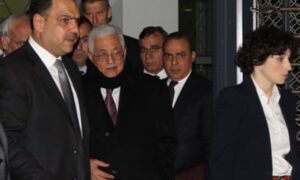
A hand-delivered threat
For Fatou Bensouda, a respected Gambian lawyer who was elected the ICC’s chief prosecutor in 2012, the accession of Palestine to the court brought with it a momentous decision. Under the Rome statute, the treaty that established the court, the ICC can exercise its jurisdiction only over crimes within member states or by nationals of those states.
Israel, like the US, Russia and China, is not a member. After Palestine’s acceptance as an ICC member, any alleged war crimes – committed by those of any nationality – in occupied Palestinian territories now fell under Bensouda’s jurisdiction.
On 16 January 2015, within weeks of Palestine joining, Bensouda opened a preliminary examination into what in the legalese of the court was called “the situation in Palestine”. The following month, two men who had managed to obtain the prosecutor’s private address turned up at her home in The Hague.
Sources familiar with the incident said the men declined to identify themselves when they arrived, but said they wanted to hand-deliver a letter to Bensouda on behalf of an unknown German woman who wanted to thank her. The envelope contained hundreds of dollars in cash and a note with an Israeli phone number.
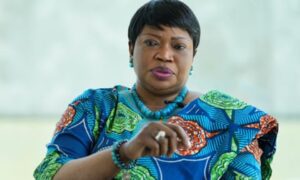
Sources with knowledge of an ICC review into the incident said that while it was not possible to identify the men, or fully establish their motives, it was concluded that Israel was likely to be signaling to the prosecutor that it knew where she lived. The ICC reported the incident to Dutch authorities and put in place additional security, installing CCTV cameras at her home.
The ICC’s preliminary inquiry in the Palestinian territories was one of several such fact-finding exercises the court was undertaking at the time, as a precursor to a possible full investigation. Bensouda’s caseload also included nine full investigations, including into events in DRC, Kenya and the Darfur region of Sudan.
Officials in the prosecutor’s office believed the court was vulnerable to espionage activity and introduced countersurveillance measures to protect their confidential inquiries.
In Israel, the prime minister’s national security council (NSC) had mobilized a response involving its intelligence agencies. Netanyahu and some of the generals and spy chiefs who authorized the operation had a personal stake in its outcome.
Unlike the international court of justice (ICJ), a UN body that deals with the legal responsibility of nation states, the ICC is a criminal court that prosecutes individuals, targeting those deemed most responsible for atrocities.
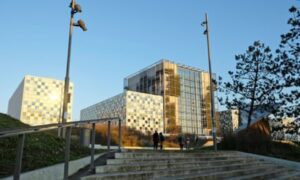
Multiple Israeli sources said the leadership of the IDF wanted military intelligence to join the effort, which was being led by other spy agencies, to ensure senior officers could be protected from charges. “We were told that senior officers are afraid to accept positions in the West Bank because they are afraid of being prosecuted in The Hague,” one source recalled.
Two intelligence officials involved in procuring intercepts about the ICC said the prime minister’s office took a keen interest in their work. Netanyahu’s office, one said, would send “areas of interests” and “instructions” in relation to the monitoring of court officials. Another described the prime minister as “obsessed” with intercepts shedding light on the activities of the ICC.
Hacked emails and monitored calls
Five sources familiar with Israel’s intelligence activities said it routinely spied on the phone calls made by Bensouda and her staff with Palestinians. Blocked by Israel from accessing Gaza and the West Bank, including East Jerusalem, the ICC was forced to conduct much of its research by telephone, which made it more susceptible to surveillance.
Thanks to their comprehensive access to Palestinian telecoms infrastructure, the sources said, intelligence operatives could capture the calls without installing spyware on the ICC official’s devices.
“If Fatou Bensouda spoke to any person in the West Bank or Gaza, then that phone call would enter [intercept] systems,” one source said. Another said there was no hesitation internally over spying on the prosecutor, adding: “With Bensouda, she’s black and African, so who cares?”
The surveillance system did not capture calls between ICC officials and anyone outside Palestine. However, multiple sources said the system required the active selection of the overseas phone numbers of ICC officials whose calls Israeli intelligence agencies decided to listen to.
According to one Israeli source, a large whiteboard in an Israeli intelligence department contained the names of about 60 people under surveillance – half of them Palestinians and half from other countries, including UN officials and ICC personnel.
In The Hague, Bensouda and her senior staff were alerted by security advisers and via diplomatic channels that Israel was monitoring their work. A former senior ICC official recalled: “We were made aware they were trying to get information on where we were with the preliminary examination.”
Officials also became aware of specific threats against a prominent Palestinian NGO, Al-Haq, which was one of several Palestinian human rights groups that frequently submitted information to the ICC inquiry, often in lengthy documents detailing incidents it wanted the prosecutor to consider. The Palestinian Authority submitted similar dossiers.
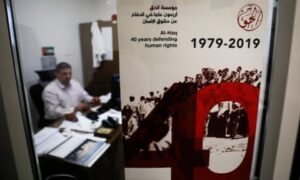
Such documents often contained sensitive information such as testimony from potential witnesses. Al-Haq’s submissions are also understood to have linked specific allegations of Rome statute crimes to senior officials, including chiefs of the IDF, directors of the Shin Bet, and defense ministers such as Benny Gantz.
Years later, after the ICC had opened a full investigation into the Palestine case, Gantz designated Al-Haq and five other Palestinian rights groups as “terrorist organizations”, a label that was rejected by multiple European states and later found by the CIA to be unsupported by evidence. The organizations said the designations were a “targeted assault” against those most actively engaging with the ICC.
According to multiple current and former intelligence officials, military cyber-offensive teams and the Shin Bet both systematically monitored the employees of Palestinian NGOs and the Palestinian Authority who were engaging with the ICC. Two intelligence sources described how Israeli operatives hacked into the emails of Al-Haq and other groups communicating with Bensouda’s office.
One of the sources said the Shin Bet even installed Pegasus spyware, developed by the private-sector NSO Group, on the phones of multiple Palestinian NGO employees, as well as two senior Palestinian Authority officials.
Keeping tabs on the Palestinian submissions to the ICC’s inquiry was viewed as part of the Shin Bet’s mandate, but some army officials were concerned that spying on a foreign civilian entity crossed a line, as it had little to do with military operations.
“It has nothing to do with Hamas, it has nothing to do with stability in the West Bank,” one military source said of the ICC surveillance. Another added: “We used our resources to spy on Fatou Bensouda – this isn’t something legitimate to do as military intelligence.”
Secret meetings with the ICC
Legitimate or otherwise, the surveillance of the ICC and Palestinians making the case for prosecutions against Israelis provided the Israeli government with an advantage in a secret back channel it had opened with the prosecutor’s office.
Israel’s meetings with the ICC were highly sensitive: if made public, they had the potential to undermine the government’s official position that it did not recognize the court’s authority.
According to six sources familiar with the meetings, they consisted of a delegation of top government lawyers and diplomats who traveled to The Hague. Two of the sources said the meetings were authorized by Netanyahu.
The Israeli delegation was drawn from the justice ministry, foreign ministry and the military advocate general’s office. The meetings took place between 2017 and 2019, and were led by the prominent Israeli lawyer and diplomat Tal Becker.
“In the beginning it was tense,” recalled a former ICC official. “We would get into details of specific incidents. We’d say: ‘We’re receiving allegations about these attacks, these killings,’ and they would provide us with information.”
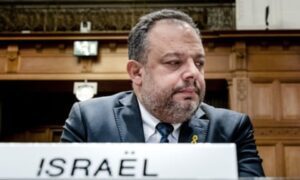
A person with direct knowledge of Israel’s preparation for the back-channel meetings said officials in the justice ministry were furnished with intelligence that had been gleaned from Israeli surveillance intercepts before delegations arrived at The Hague. “The lawyers who dealt with the issue at the justice ministry had a big thirst for intelligence information,” they said.
For the Israelis, the back-channel meetings, while sensitive, presented a unique opportunity to directly present legal arguments challenging the prosecutor’s jurisdiction over the Palestinian territories.
They also sought to convince the prosecutor that, despite the Israeli military’s highly questionable record of investigating wrongdoing in its ranks, it had robust procedures for holding its armed forces to account.
This was a critical issue for Israel. A core ICC principle, known as complementarity, prevents the prosecutor from investigating or trying individuals if they are the subject of credible state-level investigations or criminal proceedings.
Israeli surveillance operatives were asked to find out which specific incidents might form part of a future ICC prosecution, multiple sources said, in order to enable Israeli investigative bodies to “open investigations retroactively” in the same cases.
“If materials were transferred to the ICC, we had to understand exactly what they were, to ensure that the IDF investigated them independently and sufficiently so that they could claim complementarity,” one source explained.
Israel’s back-channel meetings with the ICC ended in December 2019, when Bensouda, announcing the end of her preliminary examination, said she believed there was a “reasonable basis” to conclude that Israel and Palestinian armed groups had both committed war crimes in the occupied territories.
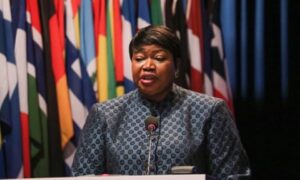
It was a significant setback for Israel’s leaders, although it could have been worse. In a move that some in the government regarded as a partial vindication of Israel’s lobbying efforts, Bensouda stopped short of launching a formal investigation.
Instead, she announced she would ask a panel of ICC judges to rule on the contentious question of the court’s jurisdiction over the Palestinian territories, due to “unique and highly contested legal and factual issues”.
Yet Bensouda had made clear she was minded to open a full investigation if the judges gave her the green light. It was against this backdrop that Israel ramped up its campaign against the ICC and turned to its top spy chief to turn up the heat on Bensouda personally.
Personal threats and a ‘smear campaign’
Between late 2019 and early 2021, as the pre-trial chamber considered the jurisdictional questions, the director of the Mossad, Yossi Cohen, intensified his efforts to persuade Bensouda not to proceed with the investigation.
Cohen’s contacts with Bensouda – which were described to the Guardian by four people familiar with the prosecutor’s contemporaneous accounts of the interactions, as well as sources briefed on the Mossad operation – had begun several years earlier.
In one of the earliest encounters, Cohen surprised Bensouda when he made an unexpected appearance at an official meeting the prosecutor was holding with the then DRC president, Joseph Kabila, in a New York hotel suite.
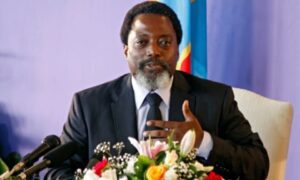
Sources familiar with the meeting said that after Bensouda’s staff were asked to leave the room, the director of the Mossad suddenly appeared from behind a door in a carefully choreographed “ambush”.
After the incident in New York, Cohen persisted in contacting the prosecutor, turning up unannounced and subjecting her to unwanted calls. While initially amicable, the sources said, Cohen’s behavior became increasingly threatening and intimidating.
A close ally of Netanyahu at the time, Cohen was a veteran Mossad spymaster and had gained a reputation within the service as a skilled recruiter of agents with experience cultivating high-level officials in foreign governments.
Accounts of his secret meetings with Bensouda paint a picture in which he sought to “build a relationship” with the prosecutor as he attempted to dissuade her from pursuing an investigation that, if it went ahead, could embroil senior Israeli officials.
Three sources briefed on Cohen’s activities said they understood the spy chief had tried to recruit Bensouda into complying with Israel’s demands during the period in which she was waiting for a ruling from the pre-trial chamber.
They said he became more threatening after he began to realize the prosecutor would not be persuaded to abandon the investigation. At one stage, Cohen is said to have made comments about Bensouda’s security and thinly veiled threats about the consequences for her career if she proceeded. Contacted by the Guardian, Cohen and Kabila did not respond to requests for comment. Bensouda declined to comment.
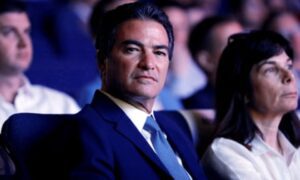
When she was prosecutor, Bensouda formally disclosed her encounters with Cohen to a small group within the ICC, with the intention of putting on record her belief that she had been “personally threatened”, sources familiar with the disclosures said.
This was not the only way Israel sought to place pressure on the prosecutor. At around the same time, ICC officials discovered details of what sources described as a diplomatic “smear campaign”, relating in part to a close family member.
According to multiple sources, the Mossad had obtained a cache of material including transcripts of an apparent sting operation against Bensouda’s husband. The origins of the material – and whether it was genuine – remain unclear.
However, elements of the information were circulated by Israel among western diplomatic officials, sources said, in a failed attempt to discredit the chief prosecutor. A person briefed on the campaign said it gained little traction among diplomats and amounted to a desperate attempt to “besmirch” Bensouda’s reputation.
Trump’s campaign against the ICC
In March 2020, three months after Bensouda referred the Palestine case to the pre-trial chamber, an Israeli government delegation reportedly held discussions in Washington with senior US officials about “a joint Israeli-American struggle” against the ICC.
One Israeli intelligence official said they regarded Donald Trump’s administration as more cooperative than that of his Democratic predecessor. The Israelis felt sufficiently comfortable to ask for information from US intelligence about Bensouda, a request the source said would have been “impossible” during Barack Obama’s tenure.
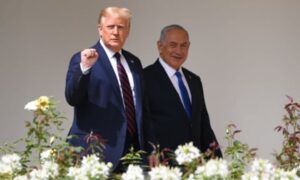
Days before the meetings in Washington, Bensouda had received authorization from the ICC’s judges to pursue a separate investigation into war crimes in Afghanistan committed by the Taliban and both Afghan and US military personnel.
Fearing US armed forces would be prosecuted, the Trump administration was engaged in its own aggressive campaign against the ICC, culminating in the summer of 2020 with the imposition of US economic sanctions on Bensouda and one of her top officials.
Among ICC officials, the US-led financial and visa restrictions on court personnel were believed to relate as much to the Palestine investigation as to the Afghanistan case. Two former ICC officials said senior Israeli officials had expressly indicated to them that Israel and the US were working together.
At a press conference in June that year, senior Trump administration figures signaled their intention to impose sanctions on ICC officials, announcing they had received unspecified information about “financial corruption and malfeasance at the highest levels of the office of the prosecutor”.
As well as referring to the Afghanistan case, Mike Pompeo, Trump’s secretary of state, linked the US measures to the Palestine case. “It’s clear the ICC is only putting Israel in [its] crosshairs for nakedly political purposes,” he said. Months later, Pompeo accused Bensouda of having “engaged in corrupt acts for her personal benefit”.
The US has never publicly provided any information to substantiate that charge, and Joe Biden lifted the sanctions months after he entered the White House.
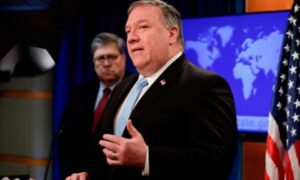
But at the time Bensouda faced increasing pressure from an apparently concerted effort behind the scenes by the two powerful allies. As a Gambian national, she did not enjoy the political protection that other ICC colleagues from western countries had by virtue of their citizenship. A former ICC source said this left her “vulnerable and isolated”.
Cohen’s activities, sources said, were particularly concerning for the prosecutor and led her to fear for her personal safety. When the pre-trial chamber finally confirmed the ICC had jurisdiction in Palestine in February 2021, some at the ICC even believed Bensouda should leave the final decision to open a full investigation to her successor.
On 3 March, however, months before the end of her nine-year term, Bensouda announced a full investigation in the Palestine case, setting in motion a process that could lead to criminal charges, though she cautioned the next phase could take time.
“Any investigation undertaken by the office will be conducted independently, impartially and objectively, without fear or favor,” she said. “To both Palestinian and Israeli victims and affected communities, we urge patience.”
Khan announces arrest warrants
When Khan took the helm at the ICC prosecutor’s office in June 2021, he inherited an investigation he later said “lies on the San Andreas fault of international politics and strategic interests”.
As he took office, other investigations – including on events in the Philippines, DRC, Afghanistan and Bangladesh – competed for his attention, and in March 2022, days after Russia launched its invasion of Ukraine, he opened a high-profile investigation into alleged Russian war crimes.
Initially, the politically sensitive Palestine inquiry was not treated as a priority by the British prosecutor’s team, sources familiar with the case said. One said it was in effect “on the shelf” – but Khan’s office disputes this and says it established a dedicated investigative team to take the inquiry forward.
In Israel, the government’s top lawyers regarded Khan – who had previously defended warlords such as the former Liberian president Charles Taylor – as a more cautious prosecutor than Bensouda. One former senior Israeli official said there was “lots of respect” for Khan, unlike for his predecessor. His appointment to the court was viewed as a “reason for optimism”, they said, but they added that the 7 October attack “changed that reality”.
The Hamas assault on southern Israel, in which Palestinian militants killed nearly 1,200 Israelis [EDITOR’S NOTE: It is unknown at this time how many of the deaths and injuries in Israel on October 7 were caused by Israeli soldiers] and kidnapped about 250 people, clearly involved brazen war crimes. So, too, in the view of many legal experts, has Israel’s subsequent onslaught on Gaza, which is estimated to have killed more than 35,000 people and brought the territory to the brink of famine through Israel’s obstruction of humanitarian aid.
By the end of the third week of Israel’s bombardment of Gaza, Khan was on the ground at the Rafah border crossing. He subsequently made visits to the West Bank and southern Israel, where he was invited to meet survivors of the 7 October attack and the relatives of people who had been killed.
In February 2024, Khan issued a strongly worded statement that Netanyahu’s legal advisers interpreted as an ominous sign. In the post on X, he in effect warned Israel against launching an assault on Rafah, Gaza’s southernmost city, where more than 1 million displaced people were sheltering at the time.
“I am deeply concerned by the reported bombardment and potential ground incursion by Israeli forces in Rafah,” he wrote. “Those who do not comply with the law should not complain later when my office takes action.”
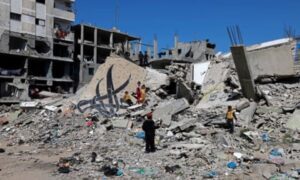
The comments stirred alarm within the Israeli government as they appeared to deviate from his previous statements about the war, which officials had viewed as reassuringly cautious. “That tweet surprised us a lot,” a senior official said.
Concerns in Israel over Khan’s intentions escalated last month when the government briefed the media that it believed the prosecutor was contemplating arrest warrants against Netanyahu and other senior officials such as Yoav Gallant.
Israeli intelligence had intercepted emails, attachments and text messages from Khan and other officials in his office. “The subject of the ICC climbed the ladder of priorities for Israeli intelligence,” one intelligence source said.
It was via intercepted communications that Israel established that Khan was at one stage considering entering Gaza through Egypt and wanted urgent assistance doing so “without Israel’s permission”.
Another Israeli intelligence assessment, circulated widely in the intelligence community, drew on surveillance of a call between two Palestinian politicians. One of them said Khan had indicated that a request for arrest warrants of Israeli leaders could be imminent, but warned he was “under tremendous pressure from the United States”.
It was against this backdrop that Netanyahu made a series of public statements warning a request for arrest warrants could be imminent. He called on “the leaders of the free world to stand firmly against the ICC” and “use all the means at their disposal to stop this dangerous move”.
He added: “Branding Israel’s leaders and soldiers as war criminals will pour jet fuel on the fires of antisemitism.” In Washington, a group of senior US Republican senators had already sent a threatening letter to Khan with a clear warning: “Target Israel and we will target you.”
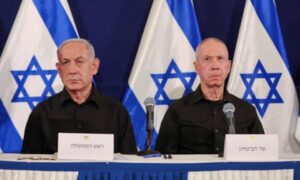
The ICC, meanwhile, has strengthened its security with regular sweeps of the prosecutor’s offices, security checks on devices, phone-free areas, weekly threat assessments and the introduction of specialist equipment. An ICC spokesperson said Khan’s office had been subjected to “several forms of threats and communications that could be viewed as attempts to unduly influence its activities”.
Khan recently disclosed in an interview with CNN that some elected leaders had been “very blunt” with him as he prepared to issue arrest warrants. “‘This court is built for Africa and for thugs like Putin,’ is was what a senior leader told me.”
Despite the pressure, Khan, like his predecessor in the prosecutor’s office, chose to press ahead. Last week, Khan announced he was seeking arrest warrants for Netanyahu and Gallant alongside three Hamas leaders for war crimes and crimes against humanity.
He said Israel’s prime minister and defence minister stood accused of responsibility for extermination, starvation, the denial of humanitarian relief supplies and deliberate targeting of civilians.
Standing at a lectern with two of his top prosecutors – one American, the other British – at his side, Khan said he had repeatedly told Israel to take urgent action to comply with humanitarian law.
“I specifically underlined that starvation as a method of war and the denial of humanitarian relief constitute Rome statute offences. I could not have been clearer,” he said. “As I also repeatedly underlined in my public statements, those who do not comply with the law should not complain later when my office takes action. That day has come.”
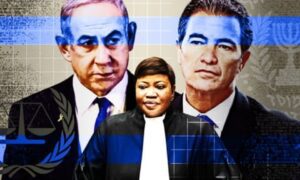
Revealed: Israeli spy chief ‘threatened’ ICC prosecutor over war crimes inquiry
Mossad director Yossi Cohen personally involved in secret plot to pressure Fatou Bensouda to drop Palestine investigation, sources say
by Harry Davies, reposted from The Guardian
The former head of the Mossad, Israel’s foreign intelligence agency, allegedly threatened a chief prosecutor of the international criminal court in a series of secret meetings in which he tried to pressure her into abandoning a war crimes investigation, the Guardian can reveal.
Yossi Cohen’s covert contacts with the ICC’s then prosecutor, Fatou Bensouda, took place in the years leading up to her decision to open a formal investigation into alleged war crimes and crimes against humanity in occupied Palestinian territories.
That investigation, launched in 2021, culminated last week when Bensouda’s successor, Karim Khan, announced that he was seeking an arrest warrant for the Israeli prime minister, Benjamin Netanyahu, over the country’s conduct in its war in Gaza.
The prosecutor’s decision to apply to the ICC’s pre-trial chamber for arrest warrants for Netanyahu and his defense minister, Yoav Gallant, alongside three Hamas leaders, is an outcome Israel’s military and political establishment has long feared.
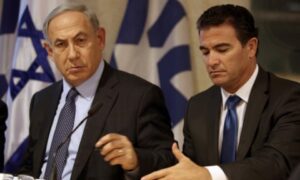
Cohen’s personal involvement in the operation against the ICC took place when he was the director of the Mossad. His activities were authorized at a high level and justified on the basis the court posed a threat of prosecutions against military personnel, according to a senior Israeli official.
Another Israeli source briefed on the operation against Bensouda said the Mossad’s objective was to compromise the prosecutor or enlist her as someone who would cooperate with Israel’s demands.
A third source familiar with the operation said Cohen was acting as Netanyahu’s “unofficial messenger”.
Cohen, who was one of Netanyahu’s closest allies at the time and is emerging as a political force in his own right in Israel, personally led the Mossad’s involvement in an almost decade-long campaign by the country to undermine the court.
Four sources confirmed that Bensouda had briefed a small group of senior ICC officials about Cohen’s attempts to sway her, amid concerns about the increasingly persistent and threatening nature of his behaviour.
Three of those sources were familiar with Bensouda’s formal disclosures to the ICC about the matter. They said she revealed Cohen had put pressure on her on several occasions not to proceed with a criminal investigation in the ICC’s Palestine case.
According to accounts shared with ICC officials, he is alleged to have told her: “You should help us and let us take care of you. You don’t want to be getting into things that could compromise your security or that of your family.”
One individual briefed on Cohen’s activities said he had used “despicable tactics” against Bensouda as part of an ultimately unsuccessful effort to intimidate and influence her. They likened his behavior to “stalking”.
The Mossad also took a keen interest in Bensouda’s family members and obtained transcripts of secret recordings of her husband, according to two sources with direct knowledge of the situation. Israeli officials then attempted to use the material to discredit the prosecutor.
The revelations about Cohen’s operation form part of a forthcoming investigation by the Guardian, the Israeli-Palestinian publication +972 Magazine and the Hebrew-language outlet Local Call, revealing how multiple Israel intelligence agencies ran a covert “war” against the ICC for almost a decade.
Contacted by the Guardian, a spokesperson for Israel’s prime minister’s office said: “The questions forwarded to us are replete with many false and unfounded allegations meant to hurt the state of Israel.” Cohen did not respond to a request for comment. Bensouda declined to comment.
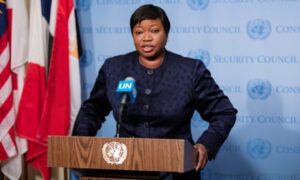
In the Mossad’s efforts to influence Bensouda, Israel received support from an unlikely ally: Joseph Kabila, the former president of the Democratic Republic of the Congo, who played a supporting role in the plot.
Revelations about the Mossad’s efforts to influence Bensouda come as the current chief prosecutor, Khan, warned in recent days that he would not hesitate to prosecute “attempts to impede, intimidate or improperly influence” ICC officials.
According to legal experts and former ICC officials, efforts by the Mossad to threaten or put pressure on Bensouda could amount to offences against the administration of justice under article 70 of the Rome statute, the treaty that established the court.
A spokesperson for the ICC would not say whether Khan had reviewed his predecessor’s disclosures about her contacts with Cohen, but said Khan had never met or spoken to the head of the Mossad.
While the spokesperson declined to comment on specific allegations, they said Khan’s office had been subjected to “several forms of threats and communications that could be viewed as attempts to unduly influence its activities”.
Bensouda sparks ire of Israel
Khan’s decision to seek arrest warrants against Netanyahu and Gallant last week marked the first time the court had taken action against leaders of a country closely allied with the US and Europe. Their alleged crimes – which include directing attacks on civilians and using starvation as a method of warfare – relate to the eight-month war in Gaza.
The ICC case, however, dates back to 2015, when Bensouda decided to open a preliminary examination into the situation in Palestine. Short of a full investigation, her inquiry was tasked with making an initial assessment of allegations of crimes by individuals in Gaza, the West Bank and East Jerusalem.
Bensouda’s decision sparked the ire of Israel, which feared its citizens could be prosecuted for their involvement in operations in Palestinian territories. Israel had long been open about its opposition to the ICC, refusing to recognize its authority. Israeli ministers intensified their attacks on the court and even vowed to try to dismantle it.
Soon after commencing the preliminary examination, Bensouda and her senior prosecutors began to receive warnings that Israeli intelligence was taking a close interest in their work.
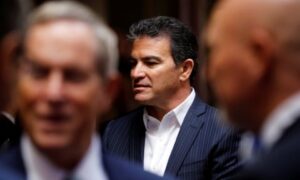
According to two sources, there were even suspicions among senior ICC officials that Israel had cultivated sources within the court’s prosecution division, known as the office of the prosecutor. Another later recalled that although the Mossad “didn’t leave its signature”, it was an assumption the agency was behind some of the activity officials had been made aware of.
Only a small group of senior figures at the ICC, however, were informed that the director of the Mossad had personally approached the chief prosecutor.
A career spy, Cohen enjoys a reputation in Israel’s intelligence community as an effective recruiter of foreign agents. He was a loyal and powerful ally of the prime minister at the time, having been appointed as director of the Mossad by Netanyahu in 2016 after working for several years at his side as his national security adviser.
As the head of the national security council between 2013 and 2016, Cohen oversaw the body that, according to multiple sources, began to coordinate a multiagency effort against the ICC once Bensouda opened the preliminary inquiry in 2015.
Cohen’s first interaction with Bensouda appears to have taken place at the Munich security conference in 2017, when the Mossad director introduced himself to the prosecutor in a brief exchange. After this encounter, Cohen subsequently “ambushed” Bensouda in a bizarre episode in a Manhattan hotel suite, according to multiple sources familiar with the incident.
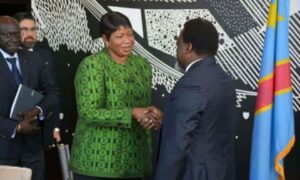
Bensouda was in New York in 2018 on an official visit, and was meeting Kabila, then the president of the DRC, at his hotel. The pair had met several times before in relation to the ICC’s ongoing investigation into alleged crimes committed in his country.
The meeting, however, appears to have been a setup. At a certain point, after Bensouda’s staff were asked to leave the room, Cohen entered, according to three sources familiar with the meeting. The surprise appearance, they said, caused alarm to Bensouda and a group of ICC officials travelling with her.
Why Kabila helped Cohen is unclear, but ties between the two men were revealed in 2022 by the Israeli publication TheMarker, which reported on a series of secretive trips the Mossad director made to the DRC throughout 2019.
According to the publication, Cohen’s trips, during which he sought Kabila’s advice “on an issue of interest to Israel”, and which were almost certainly approved by Netanyahu, were highly unusual and had astonished senior figures within the intelligence community.
Reporting on the DRC meetings in 2022, the Israeli broadcaster Kan 11 said Cohen’s trips related to an “extremely controversial plan” and cited official sources who described it as “one of Israel’s most sensitive secrets”.
Multiple sources have confirmed to the Guardian the trips were partly related to the ICC operation, and Kabila, who left office in January 2019, played an important supporting role in the Mossad’s plot against Bensouda. Kabila did not respond to a request for comment.
‘Threats and manipulation’
After the surprise meeting with Kabila and Bensouda in New York, Cohen repeatedly phoned the chief prosecutor and sought meetings with her, three sources recalled. According to two people familiar with the situation, at one stage Bensouda asked Cohen how he had obtained her phone number, to which he replied: “Did you forget what I do for a living?”
Initially, the sources explained, the intelligence chief “tried to build a relationship” with the prosecutor and played “good cop” in an attempt to charm her. The initial objective, they said, appeared to have been to enlist Bensouda into cooperating with Israel.
Over time, however, the tone of Cohen’s contact changed and he began to use a range of tactics, including “threats and manipulation”, an individual briefed on the meetings said. This prompted Bensouda to inform a small group of senior ICC officials about his behaviour.
In December 2019, the prosecutor announced that she had grounds to open a full criminal investigation into allegations of war crimes in Gaza, the West Bank and East Jerusalem. However, she held off launching it, deciding first to request a ruling from the ICC’s pre-trial chamber to confirm the court did indeed have jurisdiction over Palestine.
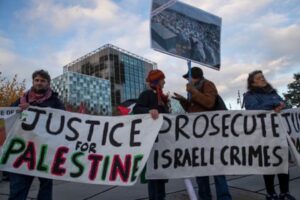
Multiple sources said it was at this stage, as the judges considered the case, that Cohen escalated his attempts to persuade Bensouda not to pursue a full investigation in the event the judges gave her the green light.
Between late 2019 and early 2021, the sources said, there were at least three encounters between Cohen and Bensouda, all initiated by the spy chief. His behavior is said to have become increasingly concerning to ICC officials.
A source familiar with Bensouda’s accounts of the final two meetings with Cohen said he had raised questions about her security, and that of her family, in a manner that led her to believe he was threatening her.
On one occasion, Cohen is said to have shown Bensouda copies of photographs of her husband, which were taken covertly when the couple were visiting London. On another, according to sources, Cohen suggested to the prosecutor that a decision to open a full investigation would be detrimental to her career.
Four sources familiar with the situation said it was around the same time that Bensouda and other ICC officials discovered that information was circulating among diplomatic channels relating to her husband, who worked as an international affairs consultant.
Between 2019 and 2020, the Mossad had been actively seeking compromising information on the prosecutor and took an interest in her family members.
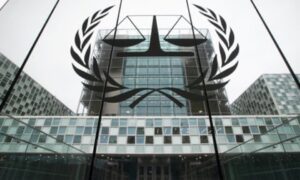
The spy agency obtained a cache of material, including transcripts of an apparent sting operation against her husband.
It is unclear who conducted the operation, or precisely what he is alleged to have said in the recordings. One possibility is that he had been targeted by the intelligence agency or by private actors of another country that wanted leverage over the ICC. Another possibility is the information was fabricated.
Once in the possession of Israel, however, the material was used by its diplomats in an unsuccessful attempt to undermine the chief prosecutor. But according to multiple sources, Israel failed to convince its allies of the significance of the material.
Three sources briefed on the information shared by Israel at a diplomatic level described the efforts as part of an unsuccessful “smear campaign” against Bensouda. “They went after Fatou,” one source said, but it had “no impact” on the prosecutor’s work.
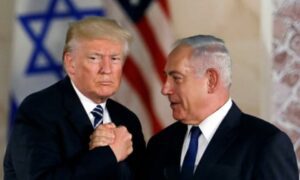
The diplomatic efforts were part of a coordinated effort by the governments of Netanyahu and Donald Trump in the US to place public and private pressure on the prosecutor and her staff.
Between 2019 and 2020, in an unprecedented decision, the Trump administration imposed visa restrictions and sanctions on the chief prosecutor. The move was in retaliation to Bensouda’s pursuit of a separate investigation into war crimes in Afghanistan, allegedly committed by the Taliban and both Afghan and US military personnel.
However, Mike Pompeo, then US secretary of state, linked the sanctions package to the Palestine case. “It’s clear the ICC is only putting Israel in [its] crosshairs for nakedly political purposes,” he said.
Months later, he accused Bensouda, without citing any evidence, of having “engaged in corrupt acts for her personal benefit”.
The US sanctions were rescinded after President Joe Biden entered the White House.
In February 2021, the ICC’s pre-trial chamber issued a ruling confirming the ICC had jurisdiction in occupied Palestinian territories. The following month, Bensouda announced the opening of the criminal investigation.
“In the end, our central concern must be for the victims of crimes, both Palestinian and Israeli, arising from the long cycle of violence and insecurity that has caused deep suffering and despair on all sides,” she said at the time.
Bensouda completed her nine-year term at the ICC three months later, leaving it to her successor, Khan, to take up the investigation. It was only after the Hamas attacks on Israel on 7 October and the ensuing war on Gaza that the ICC’s investigation gained renewed urgency, culminating in last week’s request for arrest warrants.
It was the conclusion Israel’s political, military and intelligence establishment had feared. “The fact they chose the head of Mossad to be the prime minister’s unofficial messenger to [Bensouda] was to intimidate, by definition,” said a source briefed on Cohen’s operation. “It failed.”
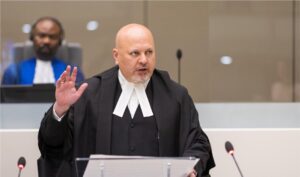
Surveillance and interference: Israel’s covert war on the ICC exposed
Top Israeli government and security officials have overseen a nine-year surveillance operation targeting the ICC and Palestinian rights groups to try to thwart a war crimes probe, a joint investigation reveals.
by Yuval Abraham and Meron Rapoport, reposted from +972 Magazine
For nearly a decade, Israel has been surveilling senior International Criminal Court officials and Palestinian human rights workers as part of a secret operation to thwart the ICC’s probe into alleged war crimes, a joint investigation by +972 Magazine, Local Call, and the Guardian can reveal.
The multi-agency operation, which dates back to 2015, has seen Israel’s intelligence community routinely surveil the court’s current chief prosecutor Karim Khan, his predecessor Fatou Bensouda, and dozens of other ICC and UN officials. Israeli intelligence also monitored materials that the Palestinian Authority submitted to the prosecutor’s office, and surveilled employees at four Palestinian human rights organizations whose submissions are central to the probe.
According to sources, the covert operation mobilized the highest branches of Israel’s government, the intelligence community, and both the civilian and military legal systems in order to derail the probe.
The intelligence information obtained via surveillance was passed on to a secret team of top Israeli government lawyers and diplomats, who traveled to The Hague for confidential meetings with ICC officials in an attempt to “feed [the chief prosecutor] information that would make her doubt the basis of her right to be dealing with this question.” The intelligence was also used by the Israeli military to retroactively open investigations into incidents that were of interest to the ICC, to try to prove that Israel’s legal system is capable of holding its own to account.
Additionally, as the Guardian reported earlier today, the Mossad, Israel’s foreign intelligence agency, ran its own parallel operation which sought out compromising information on Bensouda and her close family members in an apparent attempt to sabotage the ICC’s investigation. The agency’s former head, Yossi Cohen, personally attempted to “enlist” Bensouda and manipulate her into complying with Israel’s wishes, according to sources familiar with his activities, causing the then-prosecutor to fear for her personal safety.
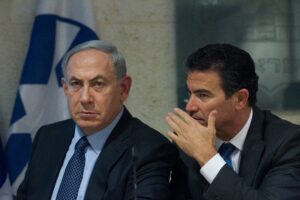
Our investigation draws on interviews with more than two dozen current and former Israeli intelligence officers and government officials, ex-ICC officials, diplomats, and lawyers familiar with the ICC case and Israel’s efforts to undermine it. According to these sources, initially, the Israeli operation attempted to prevent the court from opening a full criminal investigation; after a full probe was set in motion in 2021, Israel sought to ensure that it would come to nothing.
Moreover, according to several sources, Israel’s underhanded efforts to interfere with the investigation — which could amount to offenses against the administration of justice, punishable by a prison sentence — have been managed from the very top. Prime Minister Benjamin Netanyahu is said to have taken a keen interest in the operation, even sending intelligence teams “instructions” and “areas of interest” regarding their monitoring of ICC officials. One source stressed that Netanyahu was “obsessed, obsessed, obsessed” with finding out what materials the ICC was receiving.
The prime minister had good reason to be concerned: last week, Khan announced that his office is seeking arrest warrants for Netanyahu and Defense Minister Yoav Gallant, as well as three leaders in Hamas’ political and military wings, in relation to alleged war crimes and crimes against humanity committed on or since October 7. The announcement made clear that additional warrants — which expose prosecuted individuals to arrest should they visit any of the ICC’s 124 member states — may yet be pursued.
For Israel’s top brass, Khan’s announcement was no surprise. In recent months, the surveillance campaign targeting the chief prosecutor “climbed to the top of the agenda,” according to one source, thus giving the government advance knowledge of his intentions.
Tellingly, Khan issued a cryptic warning in his remarks: “I insist that all attempts to impede, intimidate, or improperly influence the officials of this court must cease immediately.” Now, we can reveal details of part of what he was warning against: Israel’s nine-year “war” on the ICC.
‘The generals had a big personal interest in the operation’
Unlike the International Court of Justice (ICJ), which deals with the legality of states’ actions — and which last week issued a ruling seen as calling on Israel to halt its offensive in Gaza’s southernmost city of Rafah, in the context of South Africa’s petition accusing Israel of committing genocide in the Strip — the ICC deals with specific individuals suspected of having committed war crimes.
Israel has long held that the ICC has no jurisdiction to prosecute Israeli leaders because, like the United States, Russia, and China, Israel is not a signatory to the Rome Statute which established the court, and Palestine is not a full UN member state. But Palestine was nevertheless recognized as an ICC member upon signing the convention in 2015, having been admitted to the UN General Assembly as a non-member observer state three years prior.
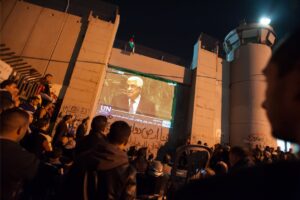
Palestine’s entry into the ICC was condemned by Israeli leaders as a form of “diplomatic terrorism.” “It was perceived as the crossing of a red line, and perhaps the most aggressive thing the Palestinian Authority has ever done to Israel in the international arena,” an Israeli official explained. “To be recognized as a state in the UN is nice, but the ICC is a mechanism with teeth.”
Immediately after becoming a member of the court, the PA asked the prosecutor’s office to investigate crimes committed in the Gaza Strip and the West Bank, including East Jerusalem, starting from the date on which the State of Palestine accepted the court’s jurisdiction: July 13, 2014. Fatou Bensouda, the chief prosecutor at the time, opened a preliminary examination to determine whether the criteria for a full investigation could be met.
Fearing the legal and political consequences of potential prosecutions, Israel raced to prepare intelligence teams in the army, the Shin Bet (domestic intelligence), and the Mossad (foreign intelligence), alongside a covert team of military and civilian lawyers, to lead the effort to forestall a full ICC investigation. All this was coordinated under Israel’s National Security Council (NSC), whose authority is derived from the Prime Minister’s Office.
“Everyone, the entire military and political establishment, was looking for ways to damage the PA’s case,” said one intelligence source. “Everyone pitched in: the Justice Ministry, the Military International Law Department [part of the Military Advocate General’s Office], the Shin Bet, the NSC. [Everyone] saw the ICC as something very important, as a war that had to be waged, and one that Israel had to be defended against. It was described in military terms.”
The military was not an obvious candidate for joining the Shin Bet’s intelligence-gathering efforts, but it had a strong motivation: preventing its commanders from being forced to stand trial. “The ones who really wanted to [join the effort] were the IDF generals themselves — they had a very big personal interest,” one source explained. “We were told that senior officers are afraid to accept positions in the West Bank because they are afraid of being prosecuted in The Hague,” another recalled.
According to numerous sources, Israel’s Ministry of Strategic Affairs, whose stated goal at the time was to fight against the “delegitimization” of Israel, was involved in the surveilling of Palestinian human rights organizations that were submitting reports to the ICC. Gilad Erdan, head of the ministry at the time and now Israel’s representative to the UN, recently described the ICC’s pursuit of arrest warrants for Israeli leaders as “a witch-hunt driven by pure Jew-hatred.”
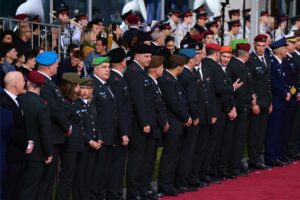
‘The army dealt with things that were completely non-military’
Israel’s covert war on the ICC has relied centrally on surveillance, and the chief prosecutors have been prime targets.
Four sources confirmed Bensouda’s private exchanges with Palestinian officials about the PA’s case in The Hague were routinely monitored and shared widely within Israel’s intelligence community. “The conversations were usually about the progress of the prosecution: submitting documents, testimonies, or talking about an event that happened — ‘Did you see how Israel massacred Palestinians at the last demonstration?’ — things like that,” one source explained.
The former prosecutor was far from the only target. Dozens of other international officials related to the probe were similarly surveilled. One of the sources said there was a large whiteboard with the names of around 60 people who were under surveillance — half of them Palestinians and half from other countries, including UN officials and ICC personnel in The Hague.
Another source recalled surveillance on the person who wrote the ICC’s report on Israel’s 2014 Gaza war. A third source said Israeli intelligence monitored a UN Human Rights Council commission of inquiry into the occupied territories, in order to identify what materials it was receiving from the Palestinians, “because the findings of commissions of inquiry of this kind are usually used by the ICC.”
In The Hague, Bensouda and her senior staff were alerted by security advisers and via diplomatic channels that Israel was monitoring their work. Care was taken not to discuss certain matters in the vicinity of phones. “We were made aware they were trying to get information on where we were with the preliminary examination,” a former senior ICC official said.
According to sources, some in the Israeli army found it controversial that military intelligence was dealing with matters that were political and not directly related to security threats. “IDF resources were used to surveil Fatou Bensouda — this isn’t something legitimate to do as military intelligence,” one source stated. “This task [was] really unusual in the sense that it was inside the army, but dealt with things that were completely non-military,” said another source.
But others had fewer hesitations. “Bensouda was very, very one-sided,” one source who surveilled the former prosecutor claimed. “She was really a personal friend of the Palestinians. Public prosecutors don’t usually behave that way. They stay very distant.”
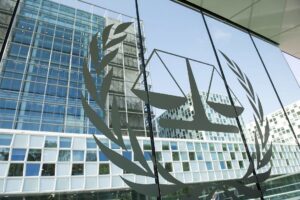
‘If you don’t want me to use the law, what do you want me to use?’
Because Palestinian human rights groups were frequently providing the prosecutor’s office with materials about Israel’s attacks on Palestinians, detailing incidents they wanted the prosecutor to consider as part of the probe, these organizations themselves became key targets of Israel’s surveillance operation. Here, the Shin Bet took the lead.
In addition to monitoring materials that the PA submitted to the ICC, Israeli intelligence also monitored appeals and reports from the human rights groups that included testimonies of Palestinians who had suffered attacks by Israeli settlers and soldiers; Israel then surveilled these testifiers, too.
“One of the [priorities] was to see who [in the human rights groups] is involved in collecting testimonies, and who were the specific people — the Palestinian victims — being convinced to give testimony to the ICC,” one intelligence source explained.
According to the sources, the primary surveillance targets were four Palestinian human rights organizations: Al-Haq, Addameer, Al Mezan, and the Palestinian Center for Human Rights (PCHR). Addameer sent appeals to the ICC about torture practices against prisoners and detainees, while the other three groups sent multiple appeals over the years regarding Israel’s settlement enterprise in the West Bank, punitive house demolitions, bombing campaigns in Gaza, and specific senior Israeli political and military leaders.
One intelligence source said the motive for surveilling the organizations was stated openly: they harm Israel’s standing in the international arena. “We were told that these are organizations that operate in the international arena, participate in BDS, and want to harm Israel legally, so they’re being monitored too,” the source said. “That’s why we’re engaging with this. Because it can hurt people in Israel — officers, politicians.”
Another goal of surveilling the Palestinian groups was to try to delegitimize them, and, by extension, the entire ICC investigation.
In October 2021, Israeli Defense Minister Benny Gantz — who himself was named in several of the appeals that Palestinian organizations sent to the ICC, due to his role as chief of staff during the 2014 Gaza war and defense minister during the May 2021 war — declared Al-Haq, Addameer, and four other Palestinian human rights groups to be “terrorist organizations.”
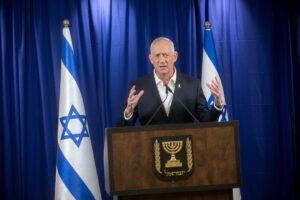
A +972 and Local Call investigation, released a few weeks later, found that Gantz’s order was issued without any serious evidence to back up its allegations; a Shin Bet dossier claiming to provide proof of its charges, and another follow-up dossier a few months later, left even Israel’s staunchest allies unconvinced. At the time, it was widely speculated — including by the organizations themselves — that these groups were targeted at least in part because of their activities relating to the ICC probe.
According to an intelligence source, the Shin Bet — which gave the initial recommendation to outlaw the six groups — surveilled the organizations’ employees, and the information gathered was used by Gantz when he declared them terrorist organizations. An investigation by Citizen Lab at the time identified Pegasus spyware, produced by the Israeli firm NSO Group, on the phones of several Palestinians working in those NGOs. (The Shin Bet did not respond to our request for comment.)
Omar Awadallah and Ammar Hijazi, who are in charge of the ICC case within the PA’s Foreign Affairs Ministry, also discovered that Pegasus had been installed on their phones. According to intelligence sources, the two were simultaneously targets of different Israeli intelligence organizations, which created “confusion.” “They’re both super impressive PhDs who deal with this subject all day, from morning to night — that’s why there was intelligence to be gained [from tracking them],” said one source.
Hijazi isn’t surprised that he was surveilled. “We don’t care if Israel sees the evidence we submitted to the court,” he said. “I invite them: Come, open your eyes, see what we presented.”
Shawan Jabarin, the director general of Al-Haq, was also surveilled by Israeli intelligence. He said there had been indications that the organization’s internal systems had been hacked, and that Gantz’s declaration came just days before Al-Haq planned to reveal that it had discovered Pegasus spyware on the phones of its employees. “They say I’m using the law as a weapon of war,” Jabarin said. “If you don’t want me to use the law, what do you want me to use, bombs?”
However, the human rights groups expressed deep concern for the privacy of the Palestinians who submitted testimonies to the court. One of the groups, for example, included only the initials of the testifiers in its submissions to the ICC, out of fear that Israel might identify them.
“People are afraid to file a complaint [to the ICC], or to mention their real names, because they fear being persecuted by the military, of losing their entry permits,” Hamdi Shakura, a lawyer at PCHR, explained. “A man in Gaza who has a relative sick with cancer is scared the army will take his entry permit and prevent his treatment — this sort of thing happens.”
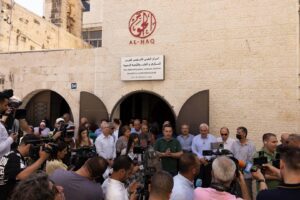
‘The lawyers had a big thirst for intelligence’
According to intelligence sources, a further use of the intelligence obtained via surveillance was to help lawyers involved in secret back-channel conversations with representatives of the prosecutor’s office in The Hague.
Soon after Bensouda announced that her office was opening a preliminary examination, Netanyahu ordered the formation of a covert team of lawyers from the Justice Ministry, Foreign Ministry, and Military Advocate General’s Office (the Israeli army’s highest legal authority), which regularly traveled to The Hague for secret meetings with ICC officials between 2017 and 2019. (Israel’s Justice Ministry did not respond to requests for comment.)
Although the team was comprised of individuals who were not part of Israel’s intelligence community — it was led by Tal Becker, legal adviser to the Foreign Ministry — the Justice Ministry was nonetheless privy to the intelligence obtained via surveillance, and had access to reports from the PA and Palestinian NGOs detailing specific cases of settler and military violence.
“The lawyers who dealt with the issue at the Justice Ministry had a big thirst for intelligence,” one intelligence source stated. “They got it from both military intelligence and the Shin Bet. They were building the case for the Israeli messengers who secretly went and communicated with the ICC.”
In their private meetings with ICC officials, which were confirmed by six sources familiar with the meetings, the lawyers set out to prove that Israel had robust and effective procedures for holding soldiers to account, despite the Israeli military’s dire record of investigating alleged wrongdoing within its ranks. The lawyers also sought to make the case that the ICC has no jurisdiction to investigate Israel’s actions, since Israel is not a member state of the court and Palestine is not a fully-fledged member of the UN.
According to a former ICC official familiar with the contents of the meetings, ICC personnel presented the Israeli lawyers with details of incidents in which Palestinians were attacked or killed, and the lawyers would respond with their own information. “In the beginning it was tense,” recalled the official.
At this stage, Bensouda was still engaged in a preliminary examination prior to the decision to open a formal investigation. An intelligence source said that the purpose of the information obtained through surveillance was “to make Bensouda feel that her legal data is unreliable.”
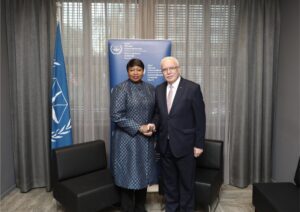
According to the source, the goal was to “feed [Bensouda] information that would make her doubt the basis of her right to be dealing with this question. When Al-Haq collects information on how many Palestinians have been killed in the occupied territories in the past year and passes it on to Bensouda, it’s in Israel’s interest and policy to pass her counterintel, and to try to undermine this information.”
Given that Israel refuses to recognize the court’s authority and legitimacy, however, it was crucial for the delegation that these meetings be kept secret. A source familiar with the meetings said the Israeli officials repeatedly stressed to the ICC that “we can never make it public that we’re communicating with you.”
Israel’s backchannel meetings with the ICC ended in December 2019, when Bensouda’s five-year preliminary examination concluded that there was a reasonable basis to believe that both Israel and Hamas had committed war crimes. Rather than immediately launching a full investigation, however, the prosecutor asked the court’s judges to rule on whether it had jurisdiction to hear the allegations due to “unique and highly contested legal and factual issues” — which some viewed as a direct outcome of Israel’s activity.
“I wouldn’t say that the legal argument had no effect,” Roy Schondorf, a member of the Israeli delegation as the head of a Justice Ministry department responsible for handling international legal proceedings against Israel, said at an event at the Institute for National Security Studies in July 2022. “There are also people there who can be persuaded, and I think that to a considerable extent, the State of Israel managed to convince at least the previous prosecutor [Bensouda], that there would be enough doubt about the question of jurisdiction for her to turn to the judges of the court.”
‘The claim of complementarity was very, very significant’
In 2021, the court’s judges ruled that the ICC does have jurisdiction over all war crimes committed by Israelis and Palestinians in the occupied Palestinian territories, as well as crimes committed by Palestinians on Israeli territory. Despite six years of Israeli efforts to forestall it, Bensouda announced the opening of a formal criminal investigation.
But it was far from a foregone conclusion. A few months earlier, the prosecutor had decided to abandon an examination into British war crimes in Iraq because she was convinced that Britain had taken “genuine” action to investigate them. According to senior Israeli jurists, Israel clung to this precedent, and initiated a close collaboration between the intelligence-gathering operation and the military justice system.
According to the sources, a central goal of Israel’s surveillance operation was to enable the military to “open investigations retroactively” into cases of violence against Palestinians that reach the prosecutor’s office in The Hague. In doing so, Israel aimed to exploit the “principle of complementarity,” which asserts that a case is inadmissible before the ICC if it is already being thoroughly investigated by a state with jurisdiction over it.
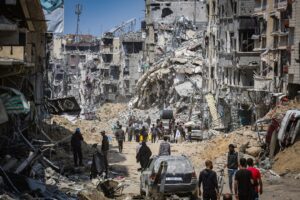
“If materials were transferred to the ICC, it had to be understood exactly what they were, to ensure that the IDF investigated them independently and sufficiently so that they could claim complementarity,” one of the sources explained. “The claim of complementarity was very, very significant.”
Legal experts within the Joint Chief of Staff’s Fact-Finding Assessment Mechanism (FFAM) — the military body that investigates alleged war crimes by Israeli soldiers — were also privy to intelligence information, sources said.
Among the dozens of incidents currently under investigation by the FFAM are the bombings that killed dozens of Palestinians in the Jabaliya refugee camp last October; the “flour massacre” in which more than 110 Palestinians were killed in northern Gaza upon the arrival of an aid convoy in March; the drone strikes that killed seven World Central Kitchen employees in April; and an airstrike in a tent encampment in Rafah that ignited a fire and killed dozens last week.
For the Palestinian NGOs filing reports with the ICC, however, Israel’s internal military accountability mechanisms are a farce. Echoed by Israeli and international experts and human rights groups, Palestinians have long argued that these systems — from police and army investigators to the Supreme Court — routinely serve as a “fig leaf” for the Israeli state and its security apparatus, helping to “whitewash” crimes while effectively granting soldiers and commanders a license to continue criminal acts with impunity.
Issam Younis, who was a target of Israeli surveillance because of his role as director of Al Mezan, spent much of his career in Gaza, in the organization’s now partially bombed offices, collecting and filing “hundreds” of complaints from Palestinians to the Israeli Military Advocate General’s Office. The vast majority of these complaints were closed with no indictments, convincing him that “victims cannot pursue justice through that system.”
This is what led his organization to engage with the ICC. “In this war, the nature and scope of crimes committed are unprecedented,” said Younis, who escaped Gaza with his family in December, and is today a refugee in Cairo. “And it’s simply because accountability was not there.”
‘October 7 changed that reality’
In June 2021, Khan replaced Bensouda as chief prosecutor, and many in the Israeli judicial system hoped this would turn over a new leaf. Khan was perceived as more cautious than his predecessor, and there was speculation that he would choose not to prioritize the explosive investigation he inherited from Bensouda.
In an interview in September 2022, in which he also revealed some details about Israel’s “informal dialogue” with the ICC, Schondorf of Israel’s Justice Ministry praised Khan for having “shifted the trajectory of the ship,” adding that it seemed like the prosecutor would focus on more “mainstream issues” because the “Israeli-Palestinian conflict became a less pressing issue for the international community.”
Meanwhile, Khan’s personal judgment became the main research target of Israel’s surveillance operation: the goal was to “understand what Khan was thinking,” as one intelligence source put it. And while initially the prosecutor’s team does not appear to have shown much enthusiasm for the Palestine case, according to a senior Israeli official, “October 7 changed that reality.”
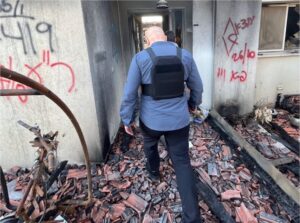
By the end of the third week of Israel’s bombardment of Gaza, which followed the Hamas-led assault on southern Israel, Khan was already on the ground at the Rafah Crossing. He subsequently made visits to both the West Bank and southern Israel in December, where he met with Palestinian officials as well as Israeli survivors of the October 7 attack and the relatives of people who had been killed.
Israeli intelligence closely followed Khan’s visit to try “to understand what materials the Palestinians were giving him,” as one Israeli source said. “Khan is the most boring man to gather intelligence about in the world, because he’s as straight as a ruler,” the source added.
In February, Khan issued a strongly-worded statement on X effectively urging Israel not to launch an assault on Rafah, where more than 1 million Palestinians were already seeking refuge. He also warned: “Those who do not comply with the law should not complain later when my office takes action.”
Just as with his predecessor, Israeli intelligence also surveilled Khan’s activities with Palestinians and other officials in his office. Surveillance of two Palestinians familiar with Khan’s intentions tipped off Israeli leaders to the fact that the prosecutor was considering an imminent request for arrest warrants for Israeli leaders, but was “under tremendous pressure from the United States” not to do so.
Eventually, on May 20, Khan followed through on his threat. He announced that he was seeking arrest warrants for Netanyahu and Gallant, after finding that there are reasonable grounds to believe that the two leaders bear responsibility for crimes including extermination, starvation, and deliberate attacks on civilians.
For the Palestinian human rights groups that Israel surveilled, Netanyahu and Gallant are just the tip of the iceberg. Three days before Khan’s announcement, the heads of Al-Haq, Al Mezan, and PCHR sent Khan a joint letter calling explicitly for arrest warrants against all members of Israel’s war cabinet, which includes Benny Gantz, as well as commanders and soldiers from the units currently involved in the Rafah offensive.
Khan now must also assess whether any Israelis behind operations aimed at undermining the ICC have committed offenses against the administration of justice. He warned in his May 20 announcement that his office “will not hesitate to act” against ongoing threats against the court and its investigation. Such offenses, for which Israeli leaders can be prosecuted regardless of the fact that Israel is not a signatory to the Rome Statute, could potentially carry a prison sentence.
An ICC spokesperson told the Guardian that it was aware of “proactive intelligence-gathering activities being undertaken by a number of national agencies hostile towards the court,” but stressed that “none of the recent attacks against it by national intelligence agencies” had penetrated the court’s core evidence holdings, which had remained secure. The spokesperson added that Khan’s office has been subjected to “several forms of threats and communications that could be viewed as attempts to unduly influence its activities.”
In response to a request for comment, the Israeli Prime Minister’s Office stated only that our report is “replete with many false and unfounded allegations meant to hurt the State of Israel.” The Israeli army also responded in brief: “Intelligence bodies in the IDF perform surveillance and other intelligence operations only against hostile elements and contrary to what is claimed, not against the ICC in The Hague or other international elements.”
CORRECTION: This article previously stated that Omar Awadallah and Ammar Hijazi work within the PA’s Justice Ministry; it has been corrected to show that they work within the Foreign Affairs Ministry.
Harry Davies and Bethan McKernan of the Guardian contributed to this report.

No comments:
Post a Comment